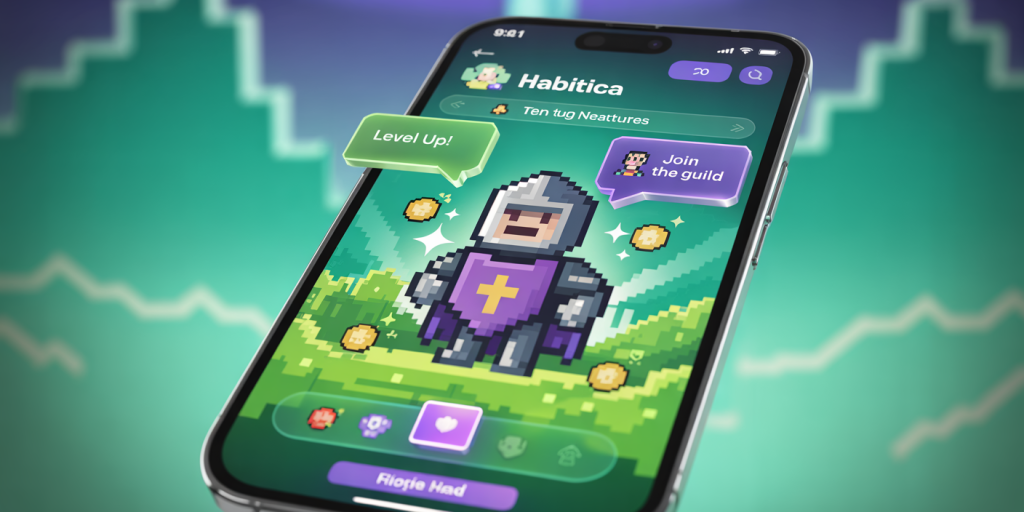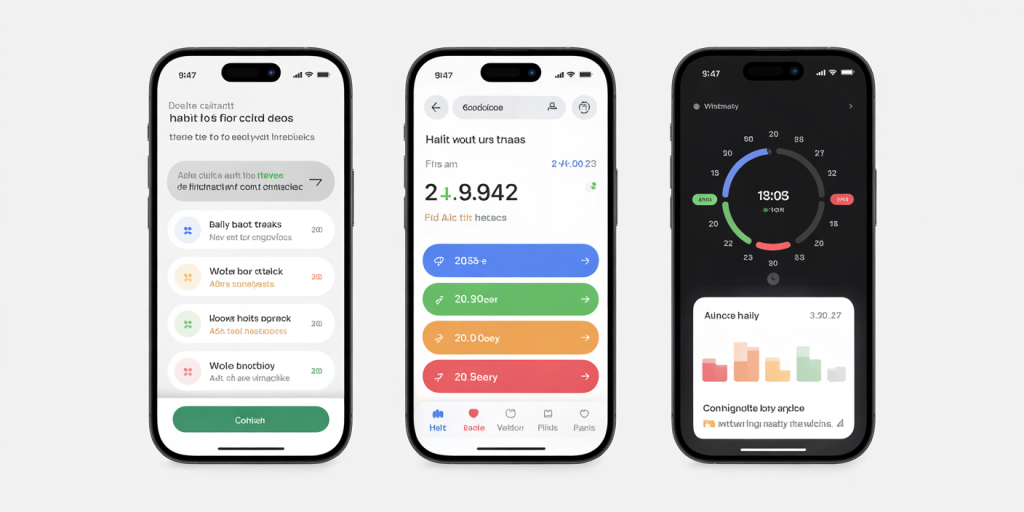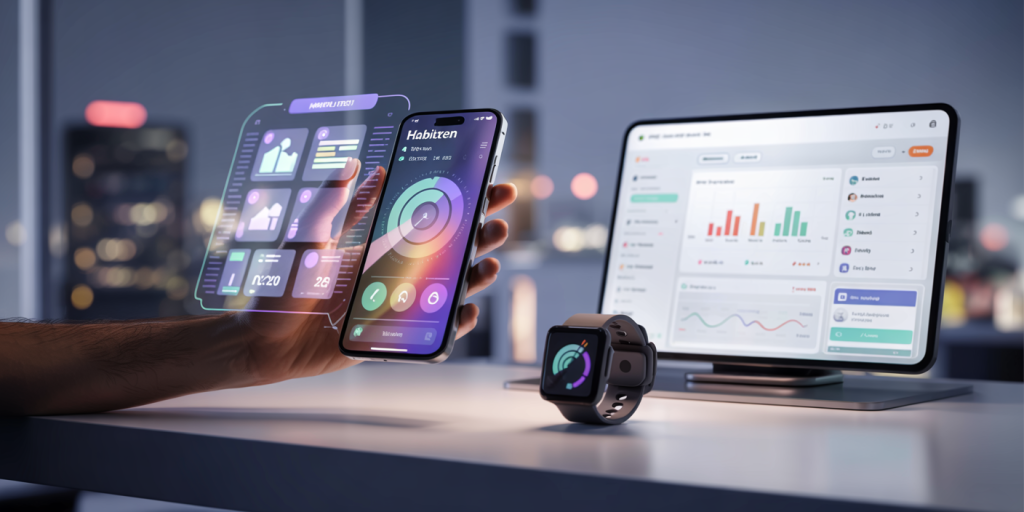Best Apps for Daily Habit Tracking and Goal Management
In today’s fast-paced world, achieving personal and professional goals requires more than just motivation—it demands consistency, tracking, and effective management tools. Daily habit tracking and goal management apps have become essential for many individuals striving to improve productivity, maintain healthy routines, or develop new skills. These apps provide tangible insights into progress and help users stay accountable over time.
Recent studies show that about 40% of our daily behaviors are habits, and harnessing the power of habit formation is critical to long-term success (Lally et al., 2010). With advancements in digital technology, numerous apps now leverage behavioral science principles and user-friendly designs to help users improve their routines. This article explores the best apps for daily habit tracking and goal management by analyzing features, user interface, and effectiveness. We will also discuss future trends shaping this rapidly evolving domain.

—
Why Habit Tracking is Crucial for Effective Goal Management
Tracking daily habits plays a pivotal role in turning abstract goals into actionable steps. Without a system to monitor consistency, it’s easy to lose track of progress or fall back into old patterns. Habit trackers serve as visual reminders and motivators, reinforcing positive behaviors through streaks, rewards, or data insights.
For example, a user aiming to read more can set a goal of reading 20 pages daily. A habit tracker app not only reminds the user every day but also displays progress streaks and monthly summaries, pushing the user to avoid breaking the chain. This accountability mechanism substantially increases the chances of habit formation. According to a study by University College London, the average time to form a new habit is about 66 days; thus, daily tracking can support this critical threshold.
Moreover, goal management encompasses more than just habit formation. It involves setting realistic objectives, breaking them down into manageable tasks, and adjusting strategies as needed. Effective goal management apps integrate goal-setting frameworks such as SMART (Specific, Measurable, Achievable, Relevant, Time-bound) to help users establish clarity and track milestones, bridging the gap between intention and achievement.
—
Top Apps for Daily Habit Tracking: Features and User Experience
Several apps specialize in habit tracking, each catering to different user preferences and needs. Three standout options are Habitica, Streaks, and HabitBull. These apps vary in design and approach, from gamification to minimalist interfaces.
Habitica combines habit tracking with role-playing game elements. Users create an avatar and earn rewards by completing tasks and habits, making the process fun and engaging. This app appeals to users who enjoy gamified motivation and community interaction. Habitica also supports social features like joining guilds and competing with friends to maintain accountability.

On the other hand, Streaks offers a clean, simple interface geared toward iOS users. It emphasizes streaks, or consecutive days of habit completion, using colors and intuitive controls to encourage daily consistency. The app supports up to twelve habits and integrates seamlessly with Apple Health for tracking fitness goals. Streaks’ minimalist design makes it ideal for users seeking straightforward habit monitoring without distractions.

HabitBull provides a more data-driven approach. It offers customizable habit goals, detailed charts, and motivational quotes. Users can track multiple habits simultaneously and receive reminders. The app also approaches habit formation from a behavioral psychology standpoint by allowing users to track cravings or triggers that might disrupt habits. HabitBull is available on both Android and iOS platforms.
| App Name | Key Features | Platforms | Best For | Pricing |
|---|---|---|---|---|
| Habitica | Gamification, social groups, rewards | Android, iOS | Gamified habit tracking | Free with optional subscription |
| Streaks | Minimalist UI, streak emphasis | iOS only | Simple, focused habit tracking | Paid (one-time fee) |
| HabitBull | Detailed charts, habit triggers | Android, iOS | Data-driven habit analysis | Free with ads; Premium available |
These examples demonstrate various pathways to habit formation through digital tools. Choosing the right app depends on user preferences and specific goals, but all reinforce the importance of consistency and accountability.
—
Goal Management Apps for Comprehensive Productivity Solutions
While habit trackers are excellent for monitoring specific behaviors, goal management apps offer broader coverage to help users plan, organize, and prioritize multiple objectives simultaneously. Among the leaders in this category are Todoist, Trello, and GoalsOnTrack.
Todoist is a powerful to-do list and task manager that helps users break down goals into manageable tasks with deadlines, labels, and priority levels. Its natural language input allows users to quickly add tasks such as “Finish report by Friday,” which the app converts into reminders. Todoist’s Karma system rewards consistent productivity, integrating elements of habit tracking into task management.
Trello, famous for its visual Kanban boards, enables users to organize goals as cards within columns that represent project stages such as “To Do,” “In Progress,” and “Done.” Teams and individuals benefit from Trello’s ability to collaborate and track project workflows in one shared space. Trello’s use case extends beyond personal goals, supporting various organizational methodologies like Agile and Scrum.
For users seeking focused goal-setting tools grounded in psychological frameworks, GoalsOnTrack stands out. It provides SMART goal templates, progress charts, and habit tracking integration. The app helps users identify roadblocks and offers journaling features to reflect on progress and learn from setbacks. Such holistic management reinforces sustained motivation and aligns habits with larger ambitions.
| App Name | Key Features | Platforms | Ideal Use Case | Pricing |
|---|---|---|---|---|
| Todoist | Task management, natural language, Karma | Android, iOS, Web | Daily task productivity and goal breakdown | Freemium; Premium subscription |
| Trello | Visual Kanban boards, collaboration | Android, iOS, Web | Project and workflow visualization | Freemium; Business class plans |
| GoalsOnTrack | SMART goal templates, journaling, habit tracking | Android, iOS, Web | Comprehensive goal setting and reflection | Paid subscription |
These goal management platforms complement habit tracking apps, offering users coordination tools to tackle complex objectives with clear structure and real-time feedback.
—
Real-World Applications and Success Stories
Numerous individuals and organizations have reported measurable improvements in productivity and habit formation by using these digital solutions. For instance, a tech startup CEO used Todoist to organize quarterly goals and daily tasks across multiple departments, increasing on-time project completion by 35% in six months. The combination of task assignment, deadlines, and progress tracking helped the company maintain focus amid rapid growth.
Similarly, a fitness trainer incorporated Streaks into client routines to promote adherence to exercise habits. The app’s streak visualization motivated clients to maintain consistency, resulting in a reported 50% higher retention rate compared to traditional methods. This practical use case highlights how behavioral nudges in apps boost engagement.
Educational settings have also benefited. Students using Habitica to gamify study habits reported increased time spent on coursework, with some completing 20% more assignments on schedule during examination periods. The camaraderie in Habitica’s community elements further enhanced motivation.
These case studies illustrate how selecting an appropriate app tailored to individual needs and goals can transform aspirations into daily realities, driving sustained success.
—
Comparative Analysis: Choosing the Right App for You
To summarize the strengths and limitations of the apps discussed, the following comparative table offers a quick reference for users deciding which tool fits their goals best.
| Criteria | Habitica | Streaks | HabitBull | Todoist | Trello | GoalsOnTrack |
|---|---|---|---|---|---|---|
| Ease of Use | Moderate | Easy | Moderate | Easy | Moderate | Moderate |
| Habit Tracking | Excellent (gamified) | Excellent (streaks) | Excellent (data focus) | Basic | Limited | Excellent |
| Goal Management | Basic | Basic | Moderate | Excellent | Excellent | Excellent |
| Collaboration | Yes (social guilds) | No | No | Limited | Excellent | No |
| Price | Free + Optional | Paid (one-time) | Free + Ads + Premium | Freemium | Freemium | Paid subscription |
| Best For | Gamified motivation | Simple daily habits | Analyzing habits | Task and goal clarity | Project management | Holistic goal setting |
By evaluating these dimensions, users can better align their selections with personal or professional priorities. Habitica’s gamification suits those who thrive on community; Streaks appeals to minimalists; HabitBull targets data enthusiasts; and Todoist, Trello, and GoalsOnTrack excel where complex goal coordination is needed.
—
Emerging Trends and Future Perspectives in Habit and Goal Apps
The intersection of artificial intelligence (AI) and habit tracking promises to evolve these platforms beyond reminders and streak counters. Emerging apps now employ machine learning algorithms to analyze user behavior and offer personalized interventions—suggesting the optimal times for habit completion, flagging potential lapses, and dynamically adjusting goals based on progress.
For instance, a 2023 survey by Statista reported that 25% of new health-related habit apps incorporate AI-based coaching features, signaling a strong trend towards intelligent habit formation support. Integration with wearable devices and biometric sensors also enriches tracking capabilities by providing real-time physiological data such as heart rate, sleep quality, or stress levels to inform habit adjustments.
Additionally, cross-platform integration is becoming crucial as users seek seamless experiences across smartphones, desktops, and smartwatches. Future apps are likely to offer more advanced multi-device synchronization ensuring users can maintain momentum wherever they are.
Moreover, social and community features will grow in sophistication, leveraging virtual reality (VR) or augmented reality (AR) environments to foster social accountability and immersion in habit-building exercises. This social reinforcement dramatically increases motivation by combining modern digital interaction with timeless psychological insights.
Lastly, ethical considerations around data privacy and user autonomy will shape the development of these apps. Transparent policies and user control over data sharing will become standard, balancing personalization with security.
—
The revolution in daily habit tracking and goal management apps reflects an ongoing commitment to improving human productivity and well-being. By choosing the right app tailored to individual preferences and leveraging future technological advancements, users stand poised to make meaningful, lasting changes in their lives.
—
References: Lally, P., van Jaarsveld, C.H.M., Potts, H.W.W., & Wardle, J. (2010). How habits are formed: Modelling habit formation in the real world. *European Journal of Social Psychology*, 40(6), 998-1009. Statista Research Department (2023). Share of health app users using AI-based coaching in the United States as of 2023. Clear, J. (2018). *Atomic Habits*. Penguin Random House.
